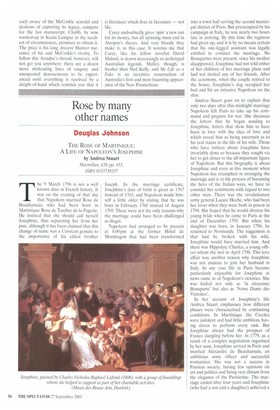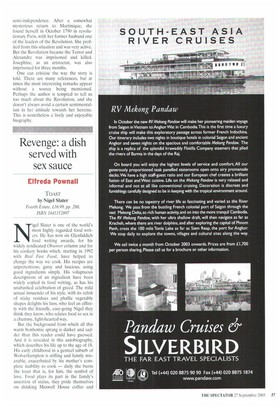Rose by many other names
Douglas Johnson
THE ROSE OF MARTINIQUE: A LIFE OF NAPOLEON'S JOSEPHINE by Andrea Stuart Macmillan, £20, pp. 455, ISBN 0333739337 The 9 March 1796 is not a well known date in French history. It was on the evening of that day that Napoleon married Rose de Beauharnais, who had been born in Martinique Rose de Tascher de la Pagerie. He insisted that she should call herself Josephine, thus separating her from her past, although it has been claimed that this change of name was a Corsican gesture to the importance of his eldest brother
Joseph. In the marriage certificate, Josephine's date of birth is given as 1767 instead of 1763, and Napoleon made himself a little older by stating that he was born in February 1768 instead of August 1769. These were not the only reasons why the marriage could have been challenged as illegal. Napoleon had arranged to be present at 8.00 pm at the former Hotel de Mondragon that had been transformed
into a town hall serving the second municipal district of Paris. But preoccupied by his campaign in Italy, he was nearly two hours late in arriving. By this time the registrar had given up, and it is by no means certain that his one-legged assistant was legally entitled to conduct the marriage. No Boriapartes were present, since his mother disapproved. Josephine had not told either of her children of her marriage plans and had not invited any of her friends. After the ceremony, when the couple retired to the house, Josephine's dog occupied her bed and bit an intrusive Napoleon on the shin.
Andrea Stuart goes on to explain that only two days after this midnight marriage Napoleon left Paris to take up his command and prepare for war. She discusses the letters that he began sending to Josephine, letters that show him to have been in love with the idea of love and which reveal him as being uncertain as to his real status in the life of his wife. Those who have written about Josephine have invariably done so because they sought via her to get closer to the all-important figure of Napoleon. But this biography is about Josephine and even at this moment when Napoleon has triumphed in arranging the marriage and is in the process of becoming the hero of the Italian wars, we have to consider her sentiments with regard to two other men. There was the revolutionary army general Lazare Hoche, who had been her lover when they were both in prison in 1794. She hoped that he would divorce his young bride when he came to Paris at the end of December 1795. But when his daughter was born, in January 1796, he returned to Normandy. The suggestion is that had he broken with his wife, Josephine would have married him. And there was Hippolyte Charles, a young officer whom she met in April 1796. This love affair was another reason why Josephine was not anxious to join her husband in Italy. In any case life in Paris became particularly enjoyable for Josephine as news came in of Napoleon's victories. She was hailed not only as `la citoyenne Bonaparte' but also as 'Notre Dame des Victoires'.
In her account of Josephine's life Andrea Stuart emphasises how different phases were characterised by contrasting conditions. In Martinique the Creoles were indolent and had little ambition, having slaves to perform every task. But Josephine always had the prospect of France dangling before her. In 1779, as a result of a complex negotiation organised by her aunt, Josephine arrived in Paris and married Alexandre de I3eauharnais, an ambitious army officer and successful womaniser. She was not a success in Parisian society, having few opinions on art and politics and being very distant from the elegance of the Parisienne. The marriage ended after four years and Josephine (who had a son and a daughter) achieved a semi-independence. After a somewhat mysterious return to Martinique, she found herself in October 1790 in revolutionary Paris, with her former husband one of the leaders of the Revolution. She profited from this situation and was very active. But the Revolution became the Terror and Alexandre was imprisoned and killed. Josephine, as an aristocrat, was also imprisoned for three months.
One can criticise the way the story is told. There are many references, but at times the most interesting remarks appear without a source being mentioned. Perhaps the author is tempted to tell us too much about the Revolution, and she doesn't always avoid a certain sentimentalism in her attitude towards her heroine. This is nonetheless a lively and enjoyable biography.



























































































 Previous page
Previous page